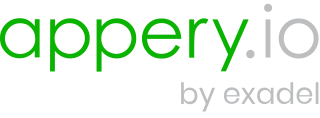In computing, cross-platform software is computer software that is designed to work in several computing platforms. Some cross-platform software requires a separate build for each platform, but some can be directly run on any platform without special preparation, being written in an interpreted language or compiled to portable bytecode for which the interpreters or run-time packages are common or standard components of all supported platforms.
An application server is a server that hosts applications or software that delivers a business application through a communication protocol. For a typical web application, the application server sits behind the web servers.
Mobile app development is the act or process by which a mobile app is developed for one or more mobile devices, which can include personal digital assistants (PDA), enterprise digital assistants (EDA), or mobile phones. Such software applications are specifically designed to run on mobile devices, taking numerous hardware constraints into consideration. Common constraints include CPU architecture and speeds, available memory (RAM), limited data storage capacities, and considerable variation in displays and input methods. These applications can be pre-installed on phones during manufacturing or delivered as web applications, using server-side or client-side processing to provide an "application-like" experience within a web browser.

Adobe AIR is a cross-platform runtime system currently developed by Harman International, in collaboration with Adobe Inc., for building desktop applications and mobile applications, programmed using Adobe Animate, ActionScript, and optionally Apache Flex. It was originally released in 2008. The runtime supports installable applications on Windows, macOS, and mobile operating systems, including Android, iOS, and BlackBerry Tablet OS.
NS Basic is a family of development tools developed and commercially marketed by NSB Corporation in Toronto, Ontario, Canada for iOS, Android, Microsoft Windows, MacOS, Linux, BlackBerry OS, WebOS, Newton OS, Palm OS, Windows CE and Windows Mobile.
Apache Cordova is a mobile application development framework created by Nitobi. Adobe Systems purchased Nitobi in 2011, rebranded it as PhoneGap, and later released an open-source version of the software called Apache Cordova. Apache Cordova enables software programmers to build hybrid web applications for mobile devices using CSS3, HTML5, and JavaScript, instead of relying on platform-specific APIs like those in Android, iOS, or Windows Phone. It enables the wrapping up of CSS, HTML, and JavaScript code depending on the platform of the device. It extends the features of HTML and JavaScript to work with the device. The resulting applications are hybrid, meaning that they are neither truly native mobile application nor purely Web-based. They are not native because all layout rendering is done via Web views instead of the platform's native UI framework. They are not Web apps because they are packaged as apps for distribution and have access to native device APIs. Mixing native and hybrid code snippets has been possible since version 1.9.

MoSync is a discontinued free and open-source software development kit (SDK) for mobile applications. It is integrated with the Eclipse development environment. The framework produces native mobile applications for multiple platforms using C/C++, HTML5 scripting and any combination thereof. The target group for MoSync are both web developers looking to enter the mobile space, as well as the ordinary PC/Mac desktop developer with knowledge in C/C++ development.

RhoMobile Suite, based on the Rhodes open source framework, is a set of development tools for creating data-centric, cross-platform, native mobile consumer and enterprise applications. It allows developers to build native mobile apps using web technologies, such as CSS3, HTML5, JavaScript and Ruby. Developers can deploy RhoMobile Suite to write an app once and run it on the most-used operating systems, including iOS, Android, Windows Phone, Windows Mobile, Windows CE, Windows 10 Mobile and Windows Desktop. Developers control how apps behave on different devices. RhoMobile Suite consists of a set of tools for building, testing, debugging, integrating, deploying and managing consumer and enterprise apps. It consists of the products Rhodes, RhoElements, RhoStudio, RhoConnect, and RhoGallery, and includes a built-in Model View Controller pattern, an Object Relational Mapper for data intensive apps, integrated data synchronization, and a broad API set. These mobile development services are offered in the cloud and include hosted build, synchronization and application management.
A mobile enterprise application platform (MEAP) is a type of mobile application development platform (MADP) that includes a suite of products, frameworks, services, and toolkits to assist in the development of mobile applications. MEAP platforms enable organisations or businesses to develop, test, and deploy applications through the use of standardization and protocols.

Xamarin is a Microsoft-owned San Francisco-based software company founded in May 2011 by the engineers that created Mono, Xamarin.Android and Xamarin.iOS, which are cross-platform implementations of the Common Language Infrastructure (CLI) and Common Language Specifications.
A mobile application or app is a computer program or software application designed to run on a mobile device such as a phone, tablet, or watch. Mobile applications often stand in contrast to desktop applications which are designed to run on desktop computers, and web applications which run in mobile web browsers rather than directly on the mobile device.
Backend as a service (BaaS), sometimes also referred to as mobile backend as a service (MBaaS), is a service for providing web app and mobile app developers with a way to easily build a backend to their frontend applications. Features available include user management, push notifications, and integration with social networking services. These services are provided via the use of custom software development kits (SDKs) and application programming interfaces (APIs). BaaS is a relatively recent development in cloud computing, with most BaaS startups dating from 2011 or later. Some of the most popular service providers are AWS Amplify and Firebase.

Appcelerator is a privately held mobile technology company based in San Jose, California. Its main products are Titanium, an open-source software development kit for cross-platform mobile development, and the Appcelerator Platform.

Ionic is an open-source UI toolkit for building cross-platform mobile, web, and desktop applications using web technologies such as HTML, CSS, and JavaScript/TypeScript. It provides a set of pre-designed UI components and tools for building high-quality, interactive applications. Ionic was originally built as a complete open-source SDK for hybrid mobile app development created by Max Lynch, Ben Sperry, and Adam Bradley of Drifty Co. in 2013. The original version was released in 2013 and built on top of AngularJS and Apache Cordova. However, the latest release was re-built as a set of Web Components using StencilJS, allowing the user to choose any user interface framework, such as Angular, React or Vue.js. It also allows the use of Ionic components with no user interface framework at all. Ionic provides tools and services for developing hybrid mobile, desktop, and progressive web apps based on modern web development technologies and practices, using Web technologies like CSS, HTML5, and Sass. In particular, mobile apps can be built with these Web technologies and then distributed through native app stores to be installed on devices by utilizing Cordova or Capacitor.
Crosswalk Project was an open-source web app runtime built with the latest releases of Chromium and Blink from Google. The project was founded by Intel's Open Source Technology Center in September 2013.
Universal Windows Platform (UWP) is a computing platform created by Microsoft and introduced in Windows 10. The purpose of this platform is to help develop universal apps that run on Windows 10, Windows 10 Mobile (discontinued), Windows 11, Xbox One, Xbox Series X/S, and HoloLens without the need to be rewritten for each. It supports Windows app development using C++, C#, VB.NET, and XAML. The API is implemented in C++, and supported in C++, VB.NET, C#, F# and JavaScript. Designed as an extension to the Windows Runtime (WinRT) platform introduced in Windows Server 2012 and Windows 8, UWP allows developers to create apps that will potentially run on multiple types of devices.

Anbox is a free and open-source compatibility layer that allows Android applications to run on Linux distributions by using containerization techniques. Originally introduced by Canonical, Anbox executes Android applications in a lightweight system container, isolated from the host system for security and efficiency.

Appery.io is a cloud-based HTML5, Ionic, jQuery Mobile, and hybrid app-building platform for developing mobile apps, web apps, and PWAs. Appery.io is a browser-based drag-and-drop visual builder tool that supports Android and iOS with integrated Apache Cordova/PhoneGap output. The platform is used by DIYers to create apps for their customers.
Mobile DevOps is a set of practices that applies the principles of DevOps specifically to the development of mobile applications. Traditional DevOps focuses on streamlining the software development process in general, but mobile development has its own unique challenges that require a tailored approach. Mobile DevOps is not simply as a branch of DevOps specific to mobile app development, instead an extension and reinterpretation of the DevOps philosophy due to very specific requirements of the mobile world.







